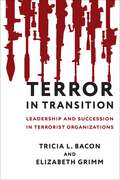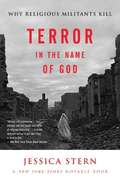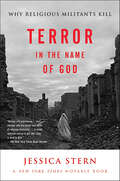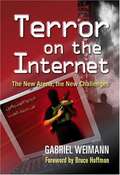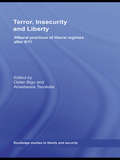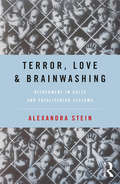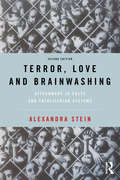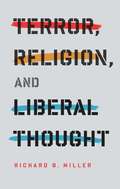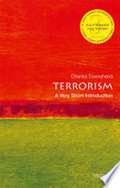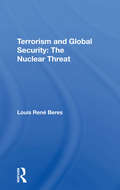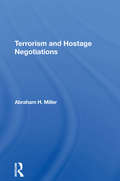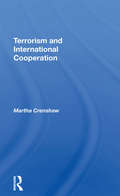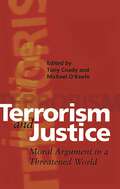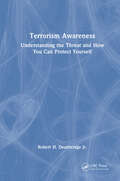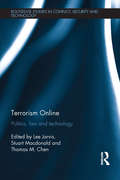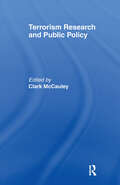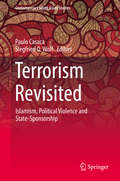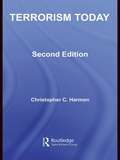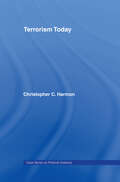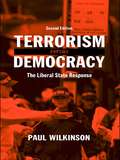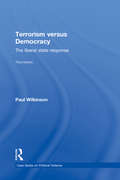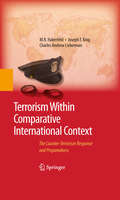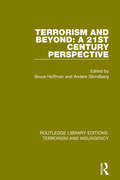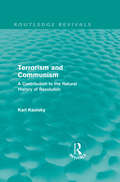- Table View
- List View
Terror in Transition: Leadership and Succession in Terrorist Organizations (Columbia Studies in Terrorism and Irregular Warfare)
by Tricia Bacon Elizabeth GrimmWhat is the role of founding leaders in shaping terrorist organizations? What follows the loss of this formative leader? These questions are especially important to religious terrorist groups, in which leaders are particularly revered.Tricia L. Bacon and Elizabeth Grimm provide a groundbreaking analysis of how religious terrorist groups manage and adapt to major shifts in leadership. They demonstrate that founders create the base from which their successors operate. Founders establish and explain the group’s mission, and they determine and justify how it seeks to achieve its objectives. Bacon and Grimm argue that how successors position themselves in terms of the founder shapes a terrorist group’s future course. They examine how and why different types of successors choose to pursue incremental or discontinuous change. Bacon and Grimm emphasize that the instability surrounding succession can place a group at its most vulnerable—the precise time to explore options to weaken or defeat it.Bacon and Grimm highlight similarities between Islamic terrorist groups abroad and Christian white nationalist groups such as the 1920s Ku Klux Klan in the United States. Drawing on extensive field research in Afghanistan, Somalia, and Pakistan, Terror in Transition features detailed analysis of groups such as al-Shabaab, Egyptian Islamic Jihad, and al-Qaeda in Iraq / the Islamic State in Iraq, as well as the KKK. Offering a rigorous theoretical perspective on terrorist leadership transition, this policy-relevant book provides actionable recommendations for counterterrorism practitioners.
Terror in the Name of God: Why Religious Militants Kill
by Jessica SternFor four years, Jessica Stern interviewed extremist members of three religions around the world: Christians, Jews, and Muslims. Traveling extensively—to refugee camps in Lebanon, to religious schools in Pakistan, to prisons in Amman, Asqelon, and Pensacola—she discovered that the Islamic jihadi in the mountains of Pakistan and the Christian fundamentalist bomber in Oklahoma have much in common. Based on her vast research, Stern lucidly explains how terrorist organizations are formed by opportunistic leaders who—using religion as both motivation and justification—recruit the disenfranchised. She depicts how moral fervor is transformed into sophisticated organizations that strive for money, power, and attention. Jessica Stern's extensive interaction with the faces behind the terror provide unprecedented insight into acts of inexplicable horror, and enable her to suggest how terrorism can most effectively be countered. A crucial book on terrorism, Terror in the Name of God is a brilliant and thought-provoking work.
Terror in the Name of God: Why Religious Militants Kill
by Jessica SternFor four years, Jessica Stern interviewed extremist members of three religions around the world: Christians, Jews, and Muslims. Traveling extensively—to refugee camps in Lebanon, to religious schools in Pakistan, to prisons in Amman, Asqelon, and Pensacola—she discovered that the Islamic jihadi in the mountains of Pakistan and the Christian fundamentalist bomber in Oklahoma have much in common.Based on her vast research, Stern lucidly explains how terrorist organizations are formed by opportunistic leaders who—using religion as both motivation and justification—recruit the disenfranchised. She depicts how moral fervor is transformed into sophisticated organizations that strive for money, power, and attention.Jessica Stern's extensive interaction with the faces behind the terror provide unprecedented insight into acts of inexplicable horror, and enable her to suggest how terrorism can most effectively be countered.A crucial book on terrorism, Terror in the Name of God is a brilliant and thought-provoking work.
Terror in the Towers: Amazing Stories from the World Trade Center Disaster
by Sydelle Kramer Adrian KersonFeatures the amazing and heroic true stories of people who were caught in the World Trade Center during the first bombing of the twin towers. Over 1000 people were trapped in the Twin Towers when a bomb went off in the basement garage in 1993. Follow the stories of students, tourists, workers, and rescuers as they deal with the aftermath. Picture descriptions present.
Terror on the Internet: The New Arena, The New Challenges
by Bruce Hoffman Gabriel WeimannDrawing on a seven-year study of the World Wide Web and a wide variety of literature, the author examines how modern terrorist organizations exploit the Internet to raise funds, recruit, and propagandize, as well as to plan and launch attacks and to publicize their chilling results.
Terror, Insecurity and Liberty: Illiberal Practices of Liberal Regimes after 9/11 (Routledge Studies In Liberty And Security Ser.)
by Anastassia Tsoukala Didier BigoThis edited volume questions the widespread resort to illiberal security practices by contemporary liberal regimes since 9/11, and argues that counter-terrorism is embedded into the very logic of the fields of politics and security.Although recent debate surrounding civil rights and liberties in post-9/11 Europe has focused on the forms, provisions
Terror, Love and Brainwashing: Attachment in Cults and Totalitarian Systems
by Alexandra SteinWritten by a cult survivor and renowned expert on cults and totalitarianism, Terror, Love and Brainwashing draws on the author’s 25 years of study and research to explain how almost anyone, given the right set of circumstances, can be radically manipulated to engage in otherwise incomprehensible and often dangerous acts. Illustrated with compelling stories from a range of cults and totalitarian systems, from religious to political to commercial, the book defines and analyses the common and identifiable traits that underlie almost all these groups. It focuses on how charismatic, authoritarian leaders control their followers’ attachment relationships via manipulative social structures and ideologies so that, emotionally and cognitively isolated, they become unable to act in their own survival interests. Using the evolutionary theory of attachment to demonstrate the psychological impact of these environments, and incorporating the latest neuroscientific findings, Stein illustrates how the combined dynamic of terror and ‘love’ works to break down people’s ability to think and behave rationally. From small local cults to global players like ISIS and North Korea, the impact of these movements is widespread and growing. This important book offers clarity and a unique perspective on the dynamics of these systems of control, and concludes with guidance to foster greater awareness and prevention. It will be essential reading for mental health professionals in the field, as well as policy makers, legal professionals, cult survivors, and their families, as well as anyone with an interest in these disturbing groups. Students of social and developmental psychology will also find it fascinating.
Terror, Love and Brainwashing: Attachment in Cults and Totalitarian Systems
by Alexandra SteinThis book explains how people can be radically manipulated by extreme groups and leaders to engage in incomprehensible and often dangerous acts through psychologically isolating situations of extreme social influence. These methods are used in totalitarian states, terrorist groups and cults, as well as in controlling personal relationships. Illustrated with compelling stories from a range of cults and totalitarian systems, Stein's book defines and analyses the common identifiable traits that underlie these groups, emphasizing the importance of maintaining open yet supportive personal networks. Using original attachment theory-based research this book highlights the dangers of closed, isolating relationships and the closed belief systems that justify them, and demonstrates the psychological impact of these environments, ending with evidence-based recommendations to support an educational approach to awareness and prevention. Featuring a foreword by John Horgan, the new edition has been fully updated to include recent work on political extremism and radicalization and totalitarian systems, as well as the recent highly publicized NXIVM case. Terror, Love and Brainwashing, second edition is essential reading for professionals, policy makers, legal professionals, educators and cult survivors and their families themselves.
Terror, Religion, and Liberal Thought (Columbia Series on Religion and Politics)
by Richard MillerReligious violence may trigger feelings of repulsion and indignation, especially in a society that encourages toleration and respect, but rejection contradicts the principles of inclusion that define a democracy and its core moral values. How can we think ethically about religious violence and terrorism, especially in the wake of such atrocities as 9/11?Known for his skillful interrogation of ethical issues as they pertain to religion, politics, and culture, Richard B. Miller returns to the basic tenets of liberalism to divine an ethical response to religious extremism. He questions how we should think about the claims and aspirations of political religions, especially when they conflict so deeply with liberal norms and practices, and he suggests how liberal critics can speak confidently in ways that respect cultural and religious difference.Miller explores other concerns within these investigations as well, such as the protection of human rights and a liberal democratic commitment to multicultural politics. In relating religion and ethics, he develops a new lens for viewing political religions and their moral responsibilities. This probing inquiry also forces us to rethink our response to 9/11.
Terrorism (Very Short Introductions Series)
by Charles TownshendThis book charts a path through the outpouring of efforts to understand and explain modern terrorism, by asking what makes terrorism different from other forms of political, military action; what makes it effective; and what can be done about it. It unravels complex central questions such aswhether terrorists are criminals, whether terrorism is a kind of war, what kind of threat terrorism represents, how far media publicity sustains terrorism, and whether democracy is especially vulnerable to terrorist attack. It examines the historical ideological and local roots of terroristviolence, and the success of specific terrorist and anti-terrorist campaigns in the more distant as well as the recent past.
Terrorism And Global Security: The Nuclear Threat--second Edition, Completely Revised And Updated
by Louis Rene BeresThe enormous potential for destruction that lies latent in nuclear technology inevitably gives rise to the possibility of nuclear terrorism—the use of nuclear explosives or radioactivity by insurgent groups. Professor Beres considers the factors that might foster such terrorism, the forms it might take, and the probable consequences of each form. He then identifies a coherent strategy of counternuclear terrorism, one that embraces both technological and behavioral measures, that suggests policies for deterrence and situation management on both national and international levels, and that points toward a major refashioning of world order.
Terrorism And Hostage Negotiations
by Abraham MillerHow effective are the methods currently used to deal with hostage situations? This study attempts to answer that question by examining the ways in which terrorists manipulate the hostage/ barricade tactic—one of the most formidable and frightening devices in their arsenal—and by analyzing the response of law enforcement officers and policymakers to its use. Drawing on case materials and interviews with high-level decision makers, both in the United States and abroad, who are involved with domestic and international terrorist operations, Professor Miller analyzes the political and psychological motifs of hostage/barricade dramas. He then looks at terrorism, particularly political terrorism, within the broader theoretical context of the general study of political violence and the operational concerns of public decision makers and law enforcement personnel.
Terrorism And International Cooperation
by Martha CrenshawThis book examines the possibility of East-West cooperation against terrorism and assesses the prospects for American-Soviet agreement. It looks at the nature of terrorism and, in examining the background to the issue, questions some of the assumptions on which past American policy has been based.
Terrorism And Justice: Moral Argument in a Threatened World
by Tony Coady Michael O'KeefeThe terrorist attacks on the United States on 11 September 2001 profoundly shocked the international community. Policy-makers are increasingly aware of the inadequacy of existing intellectual, moral and legal frameworks for dealing with such events. Terrorism and Justice is the first book since September 11 to address philosophically the moral and political underpinnings of terrorism and anti-terrorism. It brings together authors with different attitudes and original perspectives on the ethical and practical justifications offered for terrorism, and different conceptual frameworks for assessing and justifying responses to terrorism. Some defend the principle that non-combatants ('innocents' or civilians) should be immune from attack; others qualify it; others again argue that traditional distinctions between combatants and non-combatants do not apply in the case of terrorism. Can terrorism ever be justified? If not, what are the grounds for condemning it? Is your 'terrorist' my 'freedom fighter'? What are the morally appropriate responses to terrorism-diplomatically, militarily and ethically? These are some of the questions this timely book seeks to explore.
Terrorism Awareness: Understanding the Threat and How You Can Protect Yourself
by Robert H. Deatherage, Jr.Terrorism Awareness: Understanding the Threat and How You Can Protect Yourself provides readers a foundational understanding of the threats that face us every day.The goal is to introduce readers to different tactics and techniques used by terrorists—both international and domestic—to better understand personal protection concepts and, if necessary, take actions to make themselves "hard targets" that terrorist organizations will want to avoid. This includes providing a background on understanding how terrorists operate, and, more specifically, how to recognize the pre-incident indicators associated with terrorist operations. Coverage includes situation awareness of the phases of terrorist operations, common attacks, surveillance and targeting tactics, kidnapping and hostage situations, bombings and blast effects, hijacking, armed assaults, and more. With such awareness, readers can be alert to common cues to avoid dangerous situations, as well as familiarize themselves with various actions they can take to better protect themselves. Sometimes certain events may arise which are unavoidable and, in those cases, learning how to best mitigate those scenarios can mean life or death and provide the best opportunity for safety and survival. Terrorism Awareness is a helpful guide to provide anyone working or traveling in the United States or overseas—particularly in potentially volatile places subject to terrorism or civil unrest—the tools they need to recognize potential threats and to keep themselves, and those they are with, safe.
Terrorism Online: Politics, Law and Technology (Routledge Studies in Conflict, Security and Technology)
by Thomas M. Chen Lee Jarvis Stuart MacDonaldThis book investigates the intersection of terrorism, digital technologies and cyberspace. The evolving field of cyber-terrorism research is dominated by single-perspective, technological, political, or sociological texts. In contrast, Terrorism Online uses a multi-disciplinary framework to provide a broader introduction to debates and developments that have largely been conducted in isolation. Drawing together key academics from a range of disciplinary fields, including Computer Science, Engineering, Social Psychology, International Relations, Law and Politics, the volume focuses on three broad themes: 1) how – and why – do terrorists engage with the Internet, digital technologies and cyberspace?; 2) what threat do these various activities pose, and to whom?; 3) how might these activities be prevented, deterred or addressed? Exploring these themes, the book engages with a range of contemporary case studies and different forms of terrorism: from lone-actor terrorists and protest activities associated with ‘hacktivist’ groups to state-based terrorism. Through the book’s engagement with questions of law, politics, technology and beyond, the volume offers a holistic approach to cyberterrorism which provides a unique and invaluable contribution to this subject matter. This book will be of great interest to students of cybersecurity, security studies, terrorism and International Relations.
Terrorism Research and Public Policy
by Clark McCauleyFirst Published in 1991. Routledge is an imprint of Taylor & Francis, an informa company.
Terrorism Revisited
by Siegfried O. Wolf Paulo CasacaThis book develops a conceptual approach to understanding the face of contemporary terrorism as manifested in the recent attacks in Mumbai and Paris. By analyzing the historical evolution of terrorism and by offering case studies on different forms of terrorism in South Asia and elsewhere, the authors shed new light on the political strategies behind terrorist attacks, as well as on the motivations of terrorists. The case studies explore the redefinition of terrorism by the Iranian Islamic revolution, the spread of terrorism in Sunni Islam, the national jihadism in Pakistan, anti-Semitism as a main factor behind fanatical terrorist ideologies, and the case of the Tamil Tigers. "Redefining terrorism is a dynamic story that provides readers with intrigue and clarity to the ever-evolving threats that we face as a nation and as a global community. The authors masterfully navigate through the intricate maze of global terrorism bringing an overwhelming dose of reality through his usage of real life, gripping experiences. Through this book military and intelligence analysts and policy makers alike will gain first-hand knowledge about not only what the world looks like today but a glimpse into the future. " US Congressman Pete Sessions
Terrorism Today
by Christopher C. HarmonThe new edition of this best-selling insight into terrorism today has been fully updated and revised to include what the author terms the new ‘militant Moslem international.’ Drawing directly on the words and ideas of terrorists themselves, this book is an examination of patterns, current trends and future threats in terrorism worldwide. It explores the ideology and psychology, the politics and policies, the strategies and operations of many active small groups and major insurgencies. The terrorist leader emerges as a calculating, innovated and often well-educated person whose use of violence against the innocent is calibrated for maximum effects. The closing chapter is a stimulating discussion of the problems of counter-terrorism, making several key recommendations. Terrorism Today will be essential reading for students of terrorism, counter-insurgency and international security.
Terrorism Today (Political Violence Ser.)
by Christopher C HarmonFirst Published in 2000. Routledge is an imprint of Taylor & Francis, an informa company.
Terrorism Versus Democracy: The Liberal State Response
by Paul Wilkinson'No one understands terrorism better than Paul Wilkinson...if policy makers read this book they will understand the problems better. If terrorists read it they will understand themselves a lot better.' - Michael Clarke, King’s College London, University of London, UK This acclaimed study examines both the new terror networks and those that have been around for decades. This new edition brings it up-to-date with the dramatic opening of the twenty-first century, with new chapters on the 9/11 attacks, the growth of international terrorism, the Al Qaeda network and the War on Terror. This text provides us with some much needed criteria for distinguishing between terrorists and freedom fighters and an explanation of the uses of terrorism as a political, social, religious and criminal weapon. Wilkinson also links the use of terrorism to a wider repertoire of struggle. He proposes a variety of possible counter-measures and valuable principles carefully distilled from the recent past to help design a response that is compatible with democratic principles, the rule of law and respect for human rights. This book is essential reading for undergraduate and postgraduate students of terrorism studies, political science and international relations, as well as for policy makers and journalists.
Terrorism Versus Democracy: The Liberal State Response (Political Violence)
by Paul WilkinsonThis book examines the terrorist networks that operate globally and analyses the long-term future of terrorism and terrorist-backed insurgencies. Terrorism remains a serious problem for the international community. The global picture does not indicate that the ‘war on terror’, which President George W. Bush declared in the wake of the 9/11 attacks, has been won. On the other hand it would be incorrect to assume that Al Qaeda, its affiliates and other jihadi groups have won their so-called ‘holy war’ against the Coalition against Terrorism formed after 9/11. This new edition gives more attention to the political and strategic impact of modern transnational terrorism, the need for maximum international cooperation by law-abiding states to counter not only direct threats to the safety and security of their own citizens but also to preserve international peace and security through strengthening counter-proliferation and cooperative threat reduction (CTR). This book is essential reading for undergraduate and postgraduate students of terrorism studies, political science and international relations, as well as for policy makers and journalists.
Terrorism Within Comparative International Context
by Joseph F. King Charles A. Lieberman M. R. HaberfeldThe post-9/11 era, with its emphasis on preparedness against terrorist attacks, has seen an ongoing conflict of priorities between law enforcement agencies and the civilian sector: public safety versus individual rights. Community-oriented policing--mobilizing community support in partnership with local law enforcement--has been developed internationally to address this issue, and Terrorism within Comparative International Context assesses the progress and shortcomings of community-based programs. Written by leading experts in police science and based on extensive interviews and focus groups with law enforcement, media, and community representatives, the book offers: A comparative database on terror control strategies in, among others, Ireland, Turkey, Sweden, Spain, the United Kingdom and the Netherlands Analysis of the interaction between the community and local law enforcement in response to terrorist activities. Insights into the relationships between home-grown terrorists, the preventive role of the community, and the proactive role of local law enforcement. A "Best Practices" section including recommendations for investigation and interrogation techniques. A real-world template for training law enforcement personnel. Terrorism within Comparative International Context is critical reading for researchers, students and professionals across a range of interrelated fields, including criminal justice, terrorism/counterterrorism, organized crime, police science, and public administration, and makes an up-to-date textbook for courses in these areas.
Terrorism and Beyond: The 21st Century (Routledge Library Editions: Terrorism and Insurgency)
by Bruce Hoffman Anders StrindbergThe papers in this special issue of Studies in Conflict and Terrorism accompanied the conference in Oklahoma in April 2000, whose purpose was to assess developments in terrorism over the preceeding two decades, map its likely future direction and propose policy recommendations and other remedial steps to counter the menace. The conference and papers address themes such as: Continuity and changes in terrorist motivations, strategies & capabilities; policy and research concerns in coping with terrorism; evaluations of the effectiveness of both international and American counterterrorism policies and capabilities.
Terrorism and Communism: A Contribution to the Natural History of Revolution (Routledge Revivals)
by Karl KautskyFirst published in English in 1920, this work is a reissue of Karl Kautsky's seminal work dealing with the origins and history of the forces at work in revolutionary epochs, which offers pathbreaking insights on the development of civilisation. The opening chapters, dealing with eigthteenth century France, are of special interest to the student of the French revolution. The section devoted to the Commune of Paris offers a stimulating and provocative description of this famous govenment of the working class. The reissue of this controversial and extraordinary work will be welcomed by all those interested in the history of Communism in particular and the theory and history of revolution in general.
